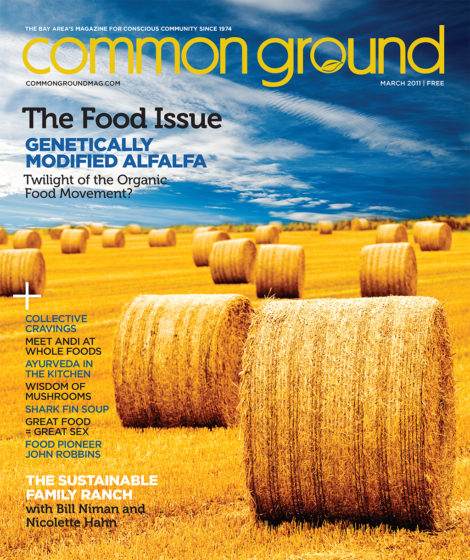The Food Issue
As publisher of Common Ground, my attention is drawn to quite a number of worthy causes, of which genetically modified organisms (GMOs) in our food supply is a particularly alarming one. Ten or 15 short years ago, GMOs didn’t exist in food; now they’re ubiquitous.
Today, 86 percent of this country’s corn is genetically engineered, as is 93 percent of the soy. The same trend holds true for sugar beets, canola, and cotton. Corn is a primary source of livestock feed and the primary ingredient in high fructose corn syrup, a widely used sweetener.
What is the effect of GE corn in our diet? If you order a meat taco and a Coke for lunch, unless you are at an organic restaurant, you’ll be feeding yourself an ample dose of GMOs, starting with the corn tortilla and chips. Expect the same from the chicken, pork, or beef, as these animals have likely been raised on genetically engineered feed. Most commercial soft drinks are sweetened with GMO corn syrup. You get the idea. For the time being, the rice and beans are untainted, but perhaps not for long.
Basically, dear readers, as if by sleight of hand, in a few short years, we’ve been collectively “dosed.” Verrry un-cool.
This year, the USDA approved genetically modified alfalfa—a serious blow. With its beautiful blue flowers, alfalfa (hay) is a favorite for bees. Thus, honey will also be contaminated, as will the animals who feed on hay.
The organic food movement, which in part emerged out of the Bay Area, has made noble strides to bring human beings back in harmony with nature. Ask yourselves: If you had a choice between naturally grown organic food versus genetically modified crops that are resistant to heavy pesticides, which would you chose?
Thankfully, this much-cherished organic food movement has given us more choices. The problem is that pure unadulterated foods will become scarce as the master genes are cloned via commercialization and irreversible pollination.
We’ve raised awareness about this issue in last March’s Food issue. Many people told me how amazed they were to learn so much about GMOs, a topic they’d heard little about. People ask me: “Why is this not in the headlines? This is our food.” Having been unknowingly dosed, I ask the same question in frustration. The labeling of GMOs in food seems to me a reasonable expectation.
As consumers, we sit at the top of the food chain. We can vote at the polls and with our dollars at the market. But don’t wait long—it’ll be too late.
On a separate note, in this issue, we’ve unearthed some other great food stories. And we’ve terrific interviews with some of the pioneers of the sustainable food movement, including John Robbins, as well as Ed and Nicolette Niman. These elders carry important wisdom, particularly with regard to the humane treatment of animals.
Thank you for reading. After years of not being on Facebook or Twitter, we finally started a Facebook page on Valentine’s day. The events in the Middle East prompted us. “Like” us on Facebook.
April is our Green Issue; May is Bay Pride; June is our Music issue.
Thanks for supporting our advertisers—the best.
You are what you eat … Bon appétit.
ROB SIDON, PUBLISHER/EDITOR
